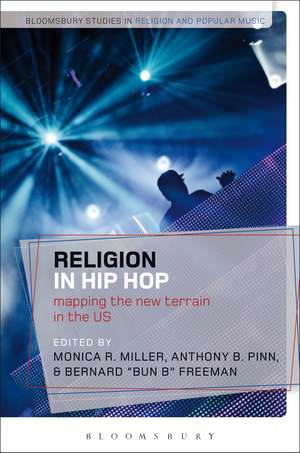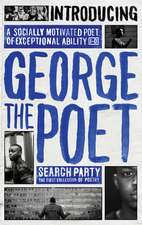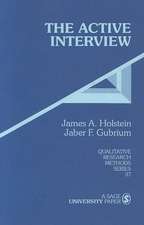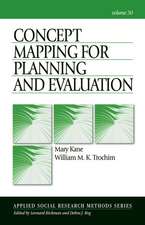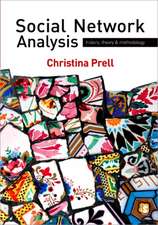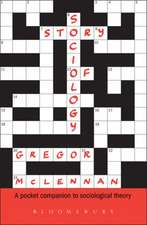Religion in Hip Hop: Mapping the New Terrain in the US: Bloomsbury Studies in Religion and Popular Music
Editat de Monica R. Miller, Anthony B. Pinn, Bernard 'Bun B' Freemanen Limba Engleză Paperback – 17 iun 2015
| Toate formatele și edițiile | Preț | Express |
|---|---|---|
| Paperback (1) | 220.75 lei 6-8 săpt. | |
| Bloomsbury Publishing – 17 iun 2015 | 220.75 lei 6-8 săpt. | |
| Hardback (1) | 716.47 lei 6-8 săpt. | |
| Bloomsbury Publishing – 17 iun 2015 | 716.47 lei 6-8 săpt. |
Preț: 220.75 lei
Preț vechi: 246.36 lei
-10% Nou
Puncte Express: 331
Preț estimativ în valută:
42.25€ • 43.94$ • 34.88£
42.25€ • 43.94$ • 34.88£
Carte tipărită la comandă
Livrare economică 15-29 aprilie
Preluare comenzi: 021 569.72.76
Specificații
ISBN-13: 9781472509079
ISBN-10: 1472509072
Pagini: 296
Dimensiuni: 156 x 234 x 15 mm
Greutate: 0.5 kg
Editura: Bloomsbury Publishing
Colecția Bloomsbury Academic
Seria Bloomsbury Studies in Religion and Popular Music
Locul publicării:London, United Kingdom
ISBN-10: 1472509072
Pagini: 296
Dimensiuni: 156 x 234 x 15 mm
Greutate: 0.5 kg
Editura: Bloomsbury Publishing
Colecția Bloomsbury Academic
Seria Bloomsbury Studies in Religion and Popular Music
Locul publicării:London, United Kingdom
Caracteristici
First book to provide framework to understand hip hop within an academic context
Notă biografică
Monica R. Miller is Assistant Professor of Religion & Africana Studies, Director of Women, Gender, and Sexuality Studies at Lehigh University, USA. Anthony B. Pinn is Agnes Cullen Arnold Professor of Humanities, Professor of Religious Studies, and Director of the Center for Engaged Research and Collaborative Learning (CERCL) at Rice University, USA.Bernard "Bun B" Freeman is an American rapper, songwriter and CERCL Distinguished Visiting Lecturer at Rice University, USA.
Cuprins
Preface: Turning Nothing Into Something is God Work': Holiness and Hurt in the Hood, Michael Eric Dyson (University of Georgetown, USA)Introduction: Context and Other Considerations, Anthony B. Pinn (Rice University, USA) & Monica R. Miller (Lehigh University, USA) Part 1: Hip Hop on Religion as/for the Embodied Self 1. Searching for Self: Religion and the Creative Quest for Self in the Art of Erykah Badu, Margarita Simon-Guillory (University of Rochester, USA)2. Methods for the Prophetic: Tupac Shakur, Lauryn Hill, and the Case for Ethnolifehistory, Daniel White-Hodge (North Park University, USA)3. Existentialist Transvaluation and Hip-Hop's Syncretic Religiosity, Julius D. Bailey (Wittenberg University, USA)4. God Complex, Complex gods, or God's Complex? Jay Z, Poor Black Youth, and Making 'The Struggle' Divine, Michael Eric Dyson (Georgetown University, USA)Part 2: Hip Hop on Religion and the 'Other' 5. A PARTICULAR PAC: Ontological Ruptures and the Posthumous Presence of Tupac Shakur, James Braxton Peterson (Lehigh University, USA)6. *iRoamThruZones* Follow Me! #NOWTHATSRELIGIONANDHIPHOP: Mapping the Terrain of Religion and Hip Hop in Cyberspace, Elonda Clay, Archivist and Digital Librarian (Philander Smith College, USA) & Ph.D. Candidate (VU University, The Netherlands) 7. Mapping Space and Place in the Analysis of Hip Hop and Religion: Houston As An Example, Maco L. Faniel, author of Hip Hop in Houston: The Origin and the Legacy (Houston, Texas, USA) 8. Imperial Whiteness Meets Hip-Hop Blackness: A Spiritual Phenomenology of the Hegemonic Body in 21st Century USA, James W. Perkinson (Ecumenical Theological Seminary, USA)9. Bun B on Religion and Hip Hop, Bernard "Bun B" Freeman (Rice University, USA)Part 3: Approaches to Religion in Hip Hop on the Margins10. Hip Hop and Humanism: Thinking Against New (and Old) Fundamentalisms, Greg Dimitriadis (University at Buffalo, SUNY, USA,)11. Conspiracy is the Sincerest Form of Flattery: Hip-Hop, Aesthetics, and Suspicious Spiritualities, John L. Jackson, Jr. (University of Pennsylvania, USA)12. Constructing Constellations: Frankfurt School, Lupe Fiasco, and the Promise of Weak Redemption, Joseph Winters (UNC Charlotte, USA)13. Zombies in the 'Hood: Rap Music, Camusian Absurdity, and the Structuring of Death, Anthony B. Pinn (Rice University, USA)14. Real Recognize Real: Aporetic Flows and the Presence of New Black Godz in Hip Hop, Monica R. Miller (Lehigh University, USA)Concluding Thoughts: The Future of the Study of Religion in/and Hip Hop, Monica R. Miller (Lehigh University, USA) & Anthony B. Pinn (Rice University, USA)Afterword: An Insider Perspective, Bernard 'Bun B' Freeman (Rice University, USA)
Recenzii
A great series of essays destined to advance and expand the field of hip-hop and religion. This collection belongs on the shelves of hip-hop heads and religious scholars alike.
Religion in Hip-Hop is an effort of immense freshness and allure, penned in bold, challenging prose. This book will excite those readers who are intrigued by what resides at the center and prowls at the edges of an important field of study. This book is highly recommended.
Will interest scholars of music and popular religion both within and well beyond 'religion and hip hop' courses.
Religion and Hip Hop productively exemplifies another long-standing concern of popular music studies: collaborations between academics and musicians.
Reading these essays reminded me of the pleasure of reading the provocative labels in wine stores: you feel language stretching beyond itself to coax and caress, to capture what it can of the elusive substance that you want more than anything to taste. How wonderful that academic discourse can seduce us into the complexity of music and the broad vision of hip hop, a wine that rewards bold thinking.
The field of Hip Hop Studies is ever growing, especially in the area of religion. What Miller and Pinn do in Religion and Hip Hop: Mapping the New Terrain in the US, is to offer a valuable contribution to both scholars and practitioners in the field. This volume provides us with with a much needed understanding of how religion functions within hip hop. A must for any Hip Hop and Religion course!
Miller and Pinn's collaborative contribution points the burgeoning study of hip hop and religion toward a bold and new trajectory of methodological innovation, theoretical sophistication, and thematic clarity. The groundbreaking implications of this work will take many years to unfold.
Hip Hop is being dissected daily. With Religion in Hip Hop: Mapping the New Terrain in the US I am proud to see it being intelligently examined by one who has risen from its underground.
Hip Hop has always been and will always be a conversation with the community it came from, and spirituality is at the center of this conversation. From rappers who call themselves God due to the Five Percenters' influence to those who wear Jesus chains, the eternal questions that religion and spirituality have tried to answer have always been asked by the Hip Hop community. Religion in Hip Hop: Mapping The New Terrain in the US highlights and examines the language of religion in hip hop that can easily be missed.
In spite of its ubiquity, Hop Hop remains a misunderstood dimension of contemporary culture. No more son than in relation to religion, where its connections are rich, layered, and compelling. Religion in Hip Hop: Mapping the New Terrain in the US addresses this situation through careful research, smart and compelling conceptual work, and thorough historical and cultural analysis. Scholarly and lay discourses about religion and media will be richer for its efforts.
Religion in Hip Hop: Mapping the New Terrain in the US showcases a new approach to the burgeoning discourse on hip-hop and religion in the academy . In short, all of the writers in this volume have stretched themselves to give insight into the academic study of hip-hop in religion, opening up several streams of discourse for the reader to build on as they take it upon themselves to continue this new tradition of critical approaches to one of the most influential and infectious subgenres of the past century.
Religion in Hip-Hop is an effort of immense freshness and allure, penned in bold, challenging prose. This book will excite those readers who are intrigued by what resides at the center and prowls at the edges of an important field of study. This book is highly recommended.
Will interest scholars of music and popular religion both within and well beyond 'religion and hip hop' courses.
Religion and Hip Hop productively exemplifies another long-standing concern of popular music studies: collaborations between academics and musicians.
Reading these essays reminded me of the pleasure of reading the provocative labels in wine stores: you feel language stretching beyond itself to coax and caress, to capture what it can of the elusive substance that you want more than anything to taste. How wonderful that academic discourse can seduce us into the complexity of music and the broad vision of hip hop, a wine that rewards bold thinking.
The field of Hip Hop Studies is ever growing, especially in the area of religion. What Miller and Pinn do in Religion and Hip Hop: Mapping the New Terrain in the US, is to offer a valuable contribution to both scholars and practitioners in the field. This volume provides us with with a much needed understanding of how religion functions within hip hop. A must for any Hip Hop and Religion course!
Miller and Pinn's collaborative contribution points the burgeoning study of hip hop and religion toward a bold and new trajectory of methodological innovation, theoretical sophistication, and thematic clarity. The groundbreaking implications of this work will take many years to unfold.
Hip Hop is being dissected daily. With Religion in Hip Hop: Mapping the New Terrain in the US I am proud to see it being intelligently examined by one who has risen from its underground.
Hip Hop has always been and will always be a conversation with the community it came from, and spirituality is at the center of this conversation. From rappers who call themselves God due to the Five Percenters' influence to those who wear Jesus chains, the eternal questions that religion and spirituality have tried to answer have always been asked by the Hip Hop community. Religion in Hip Hop: Mapping The New Terrain in the US highlights and examines the language of religion in hip hop that can easily be missed.
In spite of its ubiquity, Hop Hop remains a misunderstood dimension of contemporary culture. No more son than in relation to religion, where its connections are rich, layered, and compelling. Religion in Hip Hop: Mapping the New Terrain in the US addresses this situation through careful research, smart and compelling conceptual work, and thorough historical and cultural analysis. Scholarly and lay discourses about religion and media will be richer for its efforts.
Religion in Hip Hop: Mapping the New Terrain in the US showcases a new approach to the burgeoning discourse on hip-hop and religion in the academy . In short, all of the writers in this volume have stretched themselves to give insight into the academic study of hip-hop in religion, opening up several streams of discourse for the reader to build on as they take it upon themselves to continue this new tradition of critical approaches to one of the most influential and infectious subgenres of the past century.
